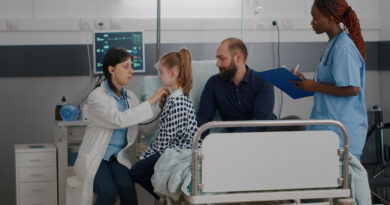Knowledge and skills of pediatric nurses
Pediatric nurses are in charge of establishing a care plan and applying it to their patients. The care for adults is different from that of children in several aspects, this is due to the fact that children are in a developmental stage and therefore deserve more attention, thus preventing illnesses or injuries from affecting their growth.
On the other hand, it is complicated for children to explain their condition, if they are sick or to indicate the symptoms they present. It is for this reason that pediatric nurses must be trained to gather as much information as possible through nonverbal cues.
The work of a pediatric nurse
The job of a pediatric nurse is varied, ranging from caring for a newborn to a young adolescent. In addition, the care is not only physical, but they must also deal with confusion and anxiety that a patient may suffer.
Among some of the tasks practiced by pediatric nurses are the following:
- Attending to wounds and changing dressings.
- Assisting physicians in examining children.
- Checking children’s temperatures.
- Assisting physicians in observing patients.
- Administering injections and medications.
- Assist relatives with eating, dressing, bed making and washing.
Work Environment
The work environment of a pediatric nurse is diverse, ranging from general hospitals, pediatric clinics and day centers. Some even make home visits to treat homebound patients.
Pediatric nurses also work alongside educational psychologists and social workers, all to assess the needs of the child and family. This allows them to create a care plan that will help determine the child’s needs and develop a care plan.
Once the plan of care is established, pediatric nurses must then proceed to use their clinical and observation skills and develop a bond with the child in order to effectively follow through with the plan of care.
Relationship with children and families
In addition to caring for children, pediatric nurses must interact with the family. This helps them stay informed about the child’s progress, but they also collaborate with the family by informing them how to apply the necessary treatments and care at home. This way they can continue care once the child returns home and is fully healed.
Professional Profile
A pediatric nurse must have the following skills to be able to practice in the field:
- Must have communication skills to gather information, encourage, reassure, and clearly explain the situation to the child.
- Must be empathetic to establish a close bond and gain trust with children, caregivers and family members.
- Be observant and anticipate the child’s needs.
- Be up to date with new treatments and procedures developed.
- Teamwork, coordination and preparation of nursing care strategies together with the rest of the medical staff.
- Interest in the development of children and the effect of certain diseases during the growth process.
Competencies
A person who chooses to become a pediatric nurse should possess the following competencies to be a skilled professional:
- Be kind and caring.
- Being attentive and able to make decisions.
- Ability to cope with distressing scenarios and work in a team.
- Reassure children and work under pressure.
- Keep up to date with new treatments and procedures.
- Respect all people equally.
- Perform established procedures to the letter.
- Must be able to maneuver various medical equipment.
- Manage a practice and refer patients from one specialist to another.
- Establish medical care plans.
- Be in good physical and psychological condition.
- Be practical.
- Train nursing students, as well as the child’s family members and caregivers to continue treatment at home.
- Be numerate and possess communication skills.
- Know how to give injections and draw blood samples.
- Keep accurate records.
- Be observant, patient, tolerant and sensitive.
- Monitor medical equipment.
- Perform minor surgery.
- Be an investigator.
- Take blood pressure, measure blood pressure and temperature of patients.
- Prescribe medications.
- Apply bandages and change them.
- Perform sutures.
- Work in the neonatal intensive care unit.
Academic Training
Those who wish to specialize in pediatric nursing must take certain courses before they can begin to practice in this profession. It should be kept in mind that, depending on the area of specialization, there is the possibility that you may have to complete the training with some additional courses, which are directed to the area in question.
Despite this, it should always be remembered that continuing education as a pediatric nurse, like any health professional, is essential for improvement.
In this way, it is possible to define the abilities and skills that a pediatric nurse must have to be able to work in the following areas




